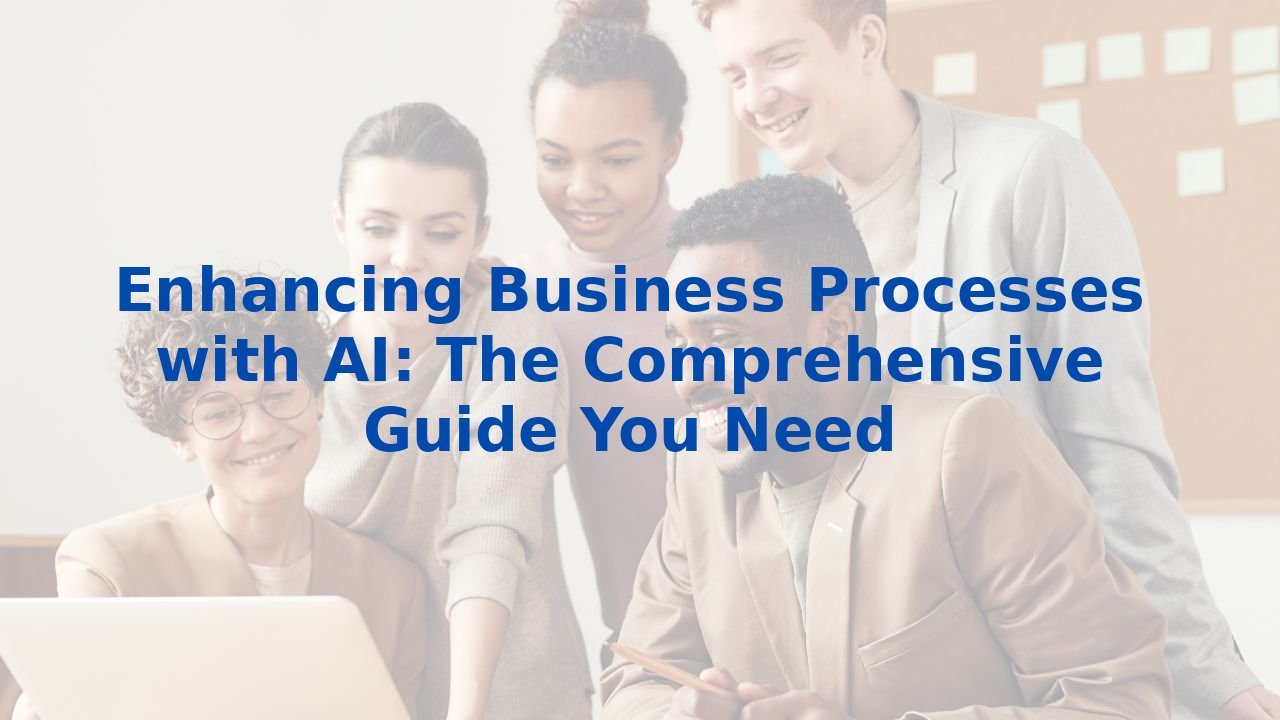Enhancing Business Processes with AI: The Comprehensive Guide You Need
Enhancing Business Processes with AI: A Comprehensive Guide
In today's fast-paced digital landscape, businesses are on a mission to discover smarter ways to operate. The integration of Artificial Intelligence (AI) into business processes is not just a trend; it's an essential strategy that offers a path toward enhanced efficiency and productivity. In this guide, we will explore the various business processes that AI enhances and emphasize the benefits of improving operational efficiency within an organization.
The Evolution of Business Process Management
Business Process Management (BPM) has long been the backbone of organizational effectiveness. Defined as the discipline of optimizing internal processes to improve efficiency and adaptability, BPM seeks to streamline workflows. However, traditional approaches often relied heavily on manual data analysis and mapping, leading to inefficiencies and risk of human error.
How AI is Revolutionizing BPM
The advent of AI presents a transformative opportunity for BPM. Here are several key areas where AI makes a significant impact:
Process Discovery and Mapping
AI utilizes innovative technologies like process mining and pattern recognition to automatically map existing business processes. This digital discovery phase uncovers inefficiencies that might elude manual observation, providing organizations with insightful and up-to-date process maps. These maps are not just static documents; they evolve with the organization, ensuring compliance and efficiency.
Process Automation
One of the most significant contributions of AI is in workflow automation. By deploying intelligent bots, businesses can streamline repetitive tasks—ranging from submitting vacation requests to onboarding processes. This automation not only accelerates workflows but also minimizes human error and reduces operational costs, giving teams the freedom to focus on more strategic initiatives.
Real-Time Monitoring and Analysis
AI empowers organizations with the ability to monitor processes in real-time. This continuous oversight enables immediate identification of bottlenecks or irregularities, allowing for proactive interventions. Whether it's a spike in operational delays or unintentional deviations from established procedures, AI provides the necessary intelligence to address challenges swiftly, keeping processes aligned with business goals.
Enhancing Customer Service
AI acts as a game-changer in customer service. Through sophisticated chatbots and virtual assistants, businesses can provide instant responses to customer inquiries. These AI systems leverage natural language processing to interpret unstructured data from sources like social media, transforming feedback into actionable insights. By enhancing customer interactions, organizations foster loyalty and elevate their brand's reputation.
Decision-Making and Optimization
AI's ability to process vast amounts of structured and unstructured data enables leaders to make informed, data-driven decisions. With advanced analytics, AI systems predict potential risks and spot trends, allowing decision-makers to simulate various scenarios before committing to a course of action. This clarity enhances strategic planning and drives smarter business outcomes.
The Benefits of AI Integration
The integration of AI within BPM unleashes a multitude of benefits that cannot be overlooked:
- Improved Efficiency: By automating mundane tasks, organizations can redirect their focus toward complex and strategic activities that fuel growth.
- Enhanced Accuracy: AI minimizes human error by executing tasks with precision, ensuring the reliability of processes.
- Real-Time Insights: Access to real-time data analysis empowers organizations to respond adeptly to market fluctuations.
- Cost Reduction: Operational costs are significantly minimized through the efficient allocation of resources enabled by automation.
- Better Decision-Making: AI augments decision-making capabilities, allowing for informed choices based on thorough data analysis.
The Importance of Employee Training
While AI offers impressive capabilities, the human element cannot be neglected. Training employees to navigate and optimize these new tools is crucial for maximizing their benefits:
- Adaptability: Well-trained employees can smoothly transition to working with AI-driven systems, mitigating disruptions.
- Skill Enhancement: With the right training, employees enhance their skill sets, becoming indispensable assets in a tech-savvy environment.
- Problem-Solving: Equipped with knowledge of AI systems, employees can quickly troubleshoot issues, ensuring operations remain uninterrupted.
- Innovation: Trained individuals are more likely to uncover new opportunities for AI integration, continually enhancing processes.
Conclusion
The embrace of AI within BPM is not just about keeping pace with technological advancements; it's about reshaping business practices for maximum efficiency and effectiveness. By automating routines, elevating customer service, and supporting informed decision-making, AI is transforming the very fabric of how businesses operate. As organizations pursue this new frontier, investing in employee training becomes vital to harnessing AI's full potential, ensuring a seamless journey into a more efficient future.
Ready to elevate your organization with AI? Explore Complete AI Training to acquire essential skills tailored for your workforce.



